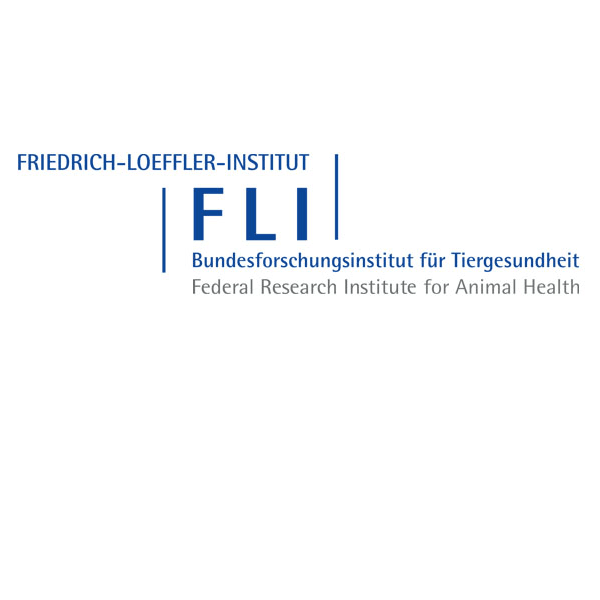
FLI – DE
Core Partner, BSL3, EU
The work of the Friedrich-Loeffler-Institut (FLI) focusses on farm animal health and welfare and on the protection of humans from zoonoses, i.e. infections which can be transmitted from animals to humans. These tasks are defined in the Animal Diseases Act / Animal Health Act. The FLI does basic and applied research in different scientific fields.
The work aims at:
1.) the prevention of diseases by
- improving rapid diagnostics
- improving prophylactic measures
- providing the background for modern control strategies for animal diseases and zoonoses
- research activities to pathology and immunology of different susceptible animal species with multiple viruses of veterinary importance as well as of viruses with zoonotic potential up to risk group 3 as basis for the design of vaccine development strategies
2.) the improvement of animal welfare and the production of high quality animal-based foodstuffs by
- improving farm animal husbandry in compliance with animal welfare
- preserving the genetic diversity of farm animals
- supporting the efficient utilisation of animal feed
As a federal research institute and independent higher federal authority under the Federal Ministry for Food and Agriculture, the FLI has a consultative function which helps provide the scientific basis for political decision-making. The institute performs epidemiological investigations during outbreaks of animal diseases. The institute also prepares risk assessments on various infectious diseases of farm animals.
The institute works as national Licensing Authority for products that are not destined for application in animals (in vitro diagnostics). Furthermore, the FLI scientifically supports the competent authorities on the implementation of Council Regulation (EC) No 1099/2009, article 20, regarding the protection of animals at the time of killing.
The Friedrich-Loeffler-Institut at Riems island houses 5 OIE reference centers for 5 different virus infections of animals (Avian Influenza, Bovine Herpesvirus-1 Infection, Newcastle Disease, Koi Herpesvirus Disease, and Rabies) as well as the WHO collaborating center for rabies surveillance and research and two FAO reference centers (Animal Influenza and Newcastle Disease of poultry as well as Classical Swine fever). Furthermore, the FLI is the OIE collaborating centre for zoonoses in Europe. At the national level, the FLI covers 44 national reference laboratories for animal diseases caused by viruses.
Thus, one of the official functions of the FLI is the provision of reference material for national as well as international veterinary laboratories. Therefore, the FLI has an accredited virus collection and will contribute different isolates of multiple viruses and derived material of veterinary importance as well as viruses with zoonotic potential up to risk group 4 to EVA-GLOBAL. Especially, the FLI will also contribute to work package 2 and provide organ material, stool, or serum samples of infected animals containing non-cultivable viruses. Furthermore, the Friedrich-Loeffler-Institut will offer access to rooms in its BSL2, BSL3 zoonosis and BSL3Ag high containment animal facilities. In our animal facilities, we could accommodate small animals, fish, sheep, goats, pigs, cattle, or poultry. Possible diseases for the BSL3Ag facility could include African swine fever virus (ASFV), Foot-and-Mouth Disease virus (FMDV), Peste des Petits ruminants virus (PPRV), Schmallenberg virus (SBV), and Bluetongue virus (BTV). Within our BSL3 zoonosisanimal facility, we could offer work with viral agents with zoonotic potential such as Highly Pathogenic Avian Influenza virus (HPAIV), Rift-Valley-Fever-virus (RVFV), and West-Nile-virus (WNV).
Additionally, the FLI will provide a large accredited cell culture collection with more than 470 different cell lines of various animal species such as insects, reptiles, fishes (e.g. grass carp, gilthead seabream, and sturgeon), birds (e.g. common blackbird, American cliff swallow, mute swan, and Eurasian magpie), mammals including livestock and pet animals (e.g. swine, cattle, sheep, goat, dog, and cat) as well as special species (e.g. serotine bat, pygmy hippopotamus, Asian elephant, yak, great panda, leopard, and Saiga-antilope). Furthermore, the FLI will provide different animal-derived material such as multiple different murine hybridoma cell lines producing monoclonal antibodies against several viral antigens and molecular and serological reference material. These essential tools will be generated routinely within our virus collection and our reference laboratories. Associated with document Ref. Ares(2019)7108488 - 18/11/2019